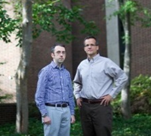How an atheist helped write a book on Christian apologetics…

The New York Times is an unlikely place for a favorable review of a book on apologetics by an Evangelical Christian. Actually, it’s the apologist and his atheist friend who are reviewed, rather than the book.
David Skeel is a well-known law professor at the University of Pennsylvania, specializing in bankruptcy and corporate law. He also writes on Christianity and law, poetry and the law, and is the author of a new book on Christian apologetics, True Paradox: How Christianity Makes Sense of Our Complex World. David Skeel also serves as an elder at Tenth Presbyterian Church in Philadelphia—the church previously pastored by the late James Montgomery Boice.
Dr. Patrick Arsenault is a postdoctoral fellow in the school of medicine at the University of Pennsylvania and an atheist.
The two men found their way to a remarkable friendship from very different backgrounds.
During his childhood near Boston, Dr. Arsenault was the nominally observant one, attending Catholic church on major holidays and when his sister sang in the choir. Only as he headed into college, away from family mores, did his skepticism start to point him toward the life sciences.
There was no religion in David Skeel’s upbringing.
Professor Skeel, the son of a teacher and an Air Force doctor, said he had “zero” experience of religion while moving six times with his father’s deployments. But after entering the University of North Carolina in 1979, he began to feel “a general sense that there had to be more than what I could see.” And he realized that his lack of any religious education left him ignorant of the biblical allusions in much of the literature he was assigned as an English major.
During a van trip to the West Coast the summer after his sophomore year, Professor Skeel opened a Bible to the first verse of Genesis and read all the way through. Though he did not formalize his ties to a particular congregation until several decades later with the Tenth Presbyterian Church in Philadelphia, he recalls in “True Paradox” that “the sheer beauty of the Bible is what first drew me in, and it’s what I go back to when I’m asked over a beer late at night why I believe that Christianity is true.”
Following a Veritas Forum at the University of Pennsylvania in 2012, Dr. Arsenault sent a note of appreciation to Professor Skeel thanking him for “for choosing to pose the big difficult questions of Christianity.” Skeel had just served as moderator of the Veritas Forum with John Lennox, a Christian and a Professor of Mathematics at the University of Oxford, on the topic “Is Anything Worth Believing In?”
Professor Skeel’s invitation to coffee led to a broad ranging discussion of a host of difficult questions.
Their ensuing discourse roved over free will, determinism, the emergence of human language, the reasons for circumcision, the human capacity for love. They traded links to magazine articles and citations from books, with Dr. Arsenault particularly steering Professor Skeel to the work of the experimental psychologist Steven Pinker. …
The Times article, interestingly, is a very nice little primer on evangelism and apologetics, touching on relationships, ideas, debates, and mutual respect—all undergirded by the virtue of listening, really listening to understand opposing viewpoints.
Amid all the respect and comity, though, the atheist and the apologist ducked no fights, especially concerning Professor Skeel’s belief that God endowed humans with humanity. Dr. Arsenault asserted in one email that men and women “are not so different from those unconscious computers.” In another, he suggested that human beings, far from being the most advanced form of life, would pale next to bacteria in terms of survival under duress. As for love, Dr. Arsenault attributed his ardor for his wife to “a neuronal change induced by mutual oxytocin release.” He referred to Professor Skeel’s God only with a lowercase g.
The effect of the emails, the coffee chats and edits was to sharpen Professor Skeel’s arguments and to encourage him to reckon with the findings of scientists like Dr. Pinker. “True Paradox” became a book of engagement rather than avoidance.
All of this was private until the recent publication of True Paradox: How Christianity Makes Sense of Our Complex World.
Not only is Dr. Arsenault acknowledged in the book, and not only is he quoted in it as a “materialist friend of mine,” but the true paradox of “True Paradox” is that the volume might not have existed at all, or certainly would not exist in its present shape and voice, without the secular scientist as its midwife. And that odd reality is testament to a rare brand of mutual civility in the culture wars, with their countervailing trends of religious fundamentalism and dogmatic atheism.
“One of the things we talked about was whether it matters if we persuade each other,” Professor Skeel, 53, recalled this week. “I long to have Patrick converted to my perspective. So how can we have a friendship? I see it as toleration in the deepest meaning. We don’t just ‘put up’ with each other’s beliefs. We interrogate them.”
Listening to those words across the table in a campus cafe, Dr. Arsenault, 31, put it this way: “I can tell David that resurrection isn’t plausible in the least. And he doesn’t flinch. I don’t have a desire for David not to be a Christian. If he came to me tomorrow and said he was dropping it, I’d be concerned. This is his family and his community. I’d feel like I had taken away a lot.”
The New York Times article, “A Christian Apologist and an Atheist Thrive in an Improbable Bond,” was and still may be available online. “How Christianity Explains Beauty and Suffering” is a Wall Street Journal review of David Keel’s True Paradox: How Christianity Makes Sense of Our Complex World.


 January 13, 2015
January 13, 2015 







Comments are closed.